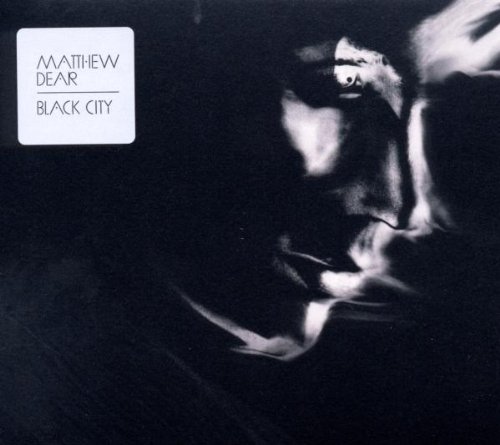
Matthew Dear
Black City
Release Date: Aug 17, 2010
Genre(s): Electronic, Techno, Club/Dance, Indie Electronic, Experimental Techno
Record label: Ghostly International
Music Critic Score
How the Music Critic Score works
Buy Black City from Amazon
Album Review: Black City by Matthew Dear
Great, Based on 12 Critics
Based on rating 8.5/10
If electronic wizard Matthew Dear's Black City actually existed as a metropolis, as its title begs people to picture, it would probably be a place of stark, unadorned architecture. Most things would probably be made of stone or dark sheet metal. It would be cold and occasionally unfeeling, but at the same time, it would be apparent that something warmer is pulsing right below the surface.
Based on rating 8.4/10
If you've followed Matthew Dear over the years, then you know he doesn't like to stay in one place for very long. Even as a primarily electronic artist in the early 2000s, Dear hopped from label to label, switched aliases often, and made everything from steely microhouse to harder Detroit techno. But his biggest departure was 2007's Asa Breed, the record where he stepped out from behind the decks and reached for the mic.
Based on rating 8.3/10
Texas DJ kicks out the words, tunes, jams Despite his well-earned techno pedigree, Matthew Dear is as much a singer/songwriter as a DJ icon. At first he commingled his dual identities, most brilliantly on the 2003 anthem “Dog Days,” but on 2007’s Asa Breed he put the words and tunes front and center, showcasing appealing tics derived from Bowie and Byrne. His new album’s opener, “Honey,” is a dirge à la Talking Heads’ “The Overload,” but that’s a red herring.
Based on rating 8/10
A young woman, her milk chocolate skin adorned in exotic, silky fabrics, bellydances against a clear blue sky. Too blue, really. As if the color was oversaturated in a video lab. And of course it is; her green-screened levitation is about as convincing as the Blue’s Clues. For some reason, though ….
Based on rating 8/10
Black City is Matthew Dear at his least penetrable and most alluring. If the David Bowie comparisons were to continue, the album would place him somewhere in Lodger territory. The dominance of inscrutable lyrics, peculiar characters and subjects, and alien rhythms makes the album more akin to the likes of Lodger's "African Night Flight," "Yassassin," and "Repetition" than the relatively straightforward "Boys Keep Swinging.
Based on rating 80%%
Matthew Dear’s slow clamber to poppy tech-house snaps into focus on his third LP, Black City. Where 2003’s warm yet lifeless Backstroke saw the DJ/Ghostly International co-founder/producer kicking against his frosty vocals, here he succumbs to the aural gloom. The trademarks of any Dear release (hulking beats, off-kilter keyboards, and nimble live drums) are present, but a confidence percolates underneath each thick thump.
Based on rating 3.5/5
For most of the last decade, Matthew Dear eluded easy categorization by constantly morphing between his various alter egos. He spent time working as False, a relatively straightforward representation focused on the producer’s allegiance to Detroit techno, followed by the whimsical Jabberjaw and the obtuse Audion. But since 2003’s Leave Luck to Heaven, his best efforts have appeared under his own name.
Based on rating 7/10
It’s difficult to know what to make of Matthew Dear’s career path at times. His first full length record, 2003’s Leave Luck to Heaven, was a fantastic album. It fused influences from pop and house music into a minimal techno template inspired by Dear’s Detroit surroundings. It marked him out as a very promising, exciting electronic musician.
Based on rating 2/5
Of Texas producer Matthew Dear's four distinct aliases, the off-kilter pop he makes under his own name has become the most prominent. This is understandable, if a little sad. As False, he crafts exquisite, subtle minimalism; as Audion, he has been responsible for some of the most relentlessly physical techno anthems of the past decade (including this year's superb Push).
Opinion: Excellent
2007’s Asa Breed saw Matthew Dear reassign the priorities of his solo identity. The funky microhouse and techno minimalism which served to structure his first two solo albums was repurposed to serve as the hooky color of an album filled with pop arrangements. Dear’s vocals moved to the fore, singing verses and choruses like a confident frontman, and he followed through on the record’s pop ambitions by touring with a live band called Matthew Dear’s Big Hands.
Opinion: Very Good
Freddie Gibbs Last year this gangsta-rap classicist from Gary, Ind., made two attention-getting mixtapes, stocking them partly with tracks from his ill-fated affiliation with a major label. The output, combined with the back story, stirred anticipation for his first commercial product, “Str8 ….
Opinion: Fairly Good
Fourth album from US tech-pop polymath. Paul Lester 2010 Black City is one of the albums of the year – and the year is 1981. You could easily imagine it being played alongside Grace Jones’ Nightclubbing, early 23 Skidoo, Japan’s Art of Parties single, extended 12-inch dance versions of tracks from Talking Heads’ Remain in Light and especially the music from David Byrne and Brian Eno’s My Life in the Bush of Ghosts project.
'Black City'
is available now

